All about Power BI Developer Salary, Roles, & Responsibilities
Contents
Welcome to the world of Power BI development, where data and analytics come together to empower businesses. As the demand for data-driven insights continues to soar, Power BI Developers play a crucial role in transforming raw data into actionable intelligence. Explore the exciting career prospects as we uncover the average salaries that these professionals command in the market. Additionally, gain valuable insights into the key roles and responsibilities that define the daily life of a Power BI Developer. In this comprehensive guide, we will delve into the fascinating realm of Power BI Developer salary, roles, and responsibilities. Get ready to discover the realm of Power BI Development!
What is Power BI Developer?
Definition of Power BI
Power BI is a business intelligence and data visualization tool developed by Microsoft. It provides a suite of software services and applications that enable users to analyze, transform, and visualize large volumes of data from multiple sources. Power BI allows individuals and organizations to gain insight into their data, make informed decisions, and share interactive reports and dashboards.
At its core, Power BI offers an extensive range of capabilities, including data connectivity, data modeling, data transformation, and data visualization. It allows users to connect to various data sources such as databases, spreadsheets, cloud services, and online platforms to extract and consolidate data. With its intuitive interface and drag-and-drop functionality, users can transform raw data into meaningful insights through data modeling, creating relationships, and defining calculations and measures.
Power BI also offers a rich set of visualization tools, including charts, graphs, maps, and tables, to present data in an interactive and visually appealing manner. Users can customize visual elements, apply filters, and drill down into data to explore trends, patterns, and relationships. Furthermore, Power BI enables collaboration and sharing of reports and dashboards across teams and organizations, facilitating data-driven decision-making and fostering a data-driven culture.
In short, Power BI is a powerful business intelligence tool that empowers users to connect, analyze, and visualize data, enabling them to gain actionable insights and drive informed decision-making.
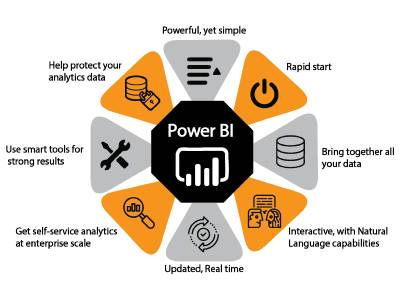
Highlight Features of Power BI
Power BI provides customers with an extensive range of features that make it a powerful and versatile business intelligence tool. Here are some exciting highlight features of Power BI:
- Data Connectivity: Power BI provides seamless connectivity to various data sources, including popular databases, online services, cloud platforms, and spreadsheets. This allows users to easily connect and access data from different sources for analysis and visualization.
- Data Transformation and Modeling: Power BI enables users to transform and shape their data using a user-friendly interface. It offers robust data modeling capabilities, allowing users to define relationships between tables, create calculated columns and measures, and apply advanced data transformations using Power Query Editor.
- Interactive Visualizations: Power BI offers a wide range of visualizations, such as charts, graphs, maps, and tables, that can be easily customized to create rich and interactive dashboards. Users can apply filters, drill down into data, and highlight key insights to explore and communicate data effectively.
- Integration with Microsoft Ecosystem: Power BI seamlessly integrates with other Microsoft tools and services, such as Excel, SharePoint, Teams, and Azure. This integration enables users to leverage their existing data and workflows, providing a unified and comprehensive analytics solution.
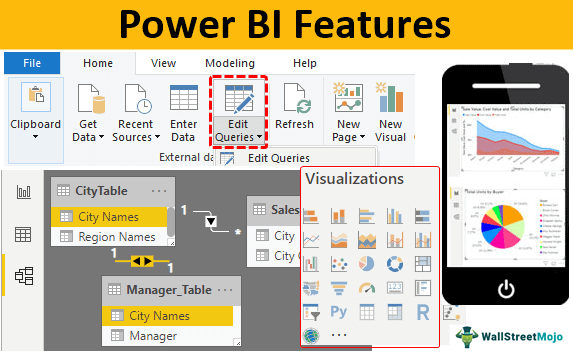
These are just a few of the many features that make Power BI a popular choice for data analytics and visualization. Its flexibility, ease of use, and extensive capabilities make it a powerful tool for organizations of all sizes to gain insights and drive data-driven decision-making.
What is a Power BI Developer?
A Power BI Developer is a professional who specializes in creating, designing, and implementing data visualization solutions using Microsoft Power BI. They have a deep understanding of Power BI’s features, capabilities, and best practices to develop robust and effective business intelligence solutions.
Power BI Developers often work closely with data analysts, business stakeholders, and IT teams to understand business requirements, translate them into technical solutions, and deliver impactful data visualizations. They play a critical role in helping organizations unlock the power of their data and drive data-driven decision-making with Power BI.
There are some roles and responsibilities of Power BI developers that we will introduce to you in the following section.

Power BI Job Roles and Responsibilities
Power BI provides a diverse range of job positions and duties in the realm of data analytics and visualization. Below are several typical job roles in Power BI along with their corresponding responsibilities:
Power BI Developer:
- Designing and developing interactive and visually appealing dashboards and reports using Power BI.
- Creating and optimizing data models, defining relationships, and implementing accuracy and quality.
- Collaborating with stakeholders to gather requirements, understand business needs, and deliver effective data visualizations.
- Ensuring data governance, security, and compliance measures are implemented.
- Staying up-to-date with the latest Power BI features, best practices, and industry trends.
Power BI Analyst:
- Analyzing data using Power BI tools and techniques to identify trends, patterns, and insights.
- Creating interactive dashboards and reports to present data findings to the stakeholders.
- Collaborating with business users to understand their analytical requirements and providing data-driven solutions.
- Conducting data profiling and data quality assessments.
- Developing and maintaining data documentation and metadata.
Power BI Consultant:
- Providing consultation and guidance on Power BI implementation and adoption strategies.
- Assessing client requirements, recommending appropriate Power BI solutions, and developing implementation plans.
- Designing and configuring data pipelines, ETL processes, and data integration workflows.
- Conducting training sessions and workshops to educate clients on Power BI functionality and best practices.
- Troubleshooting and resolving technical issues related to Power BI implementation.
- Supporting clients in leveraging Power BI for data-driven decision-making and achieving business objectives.
Power BI Administrator:
- Managing Power BI environments, including user access, security, and permissions.
- Monitoring and optimizing performance with data security regulations.
- Configuring data refresh schedules and managing data source connections.
- Troubleshooting and resolving technical issues related to Power BI administration.
- Providing support and training to users on Power BI features and functionalities.
Power BI Architect:
- Designing end-to-end Power BI solutions, including data integration, modeling, and visualization.
- Defining architectural standards and best practices for Power BI implementation,
- Collaborating with stakeholders to gather requirements, design data models, and establish data governance processes.
- Leading the implementation and development of Power BI projects.
- Conducting performance tuning and optimization of Power BI solutions.
- Keeping abreast of emerging technologies and trends in the data analytics and visualization space to drive innovation.
These Power BI developer roles and responsibilities may vary depending on the organization and the specific project requirements. However, they provide a general overview of the key responsibilities associated with different Power BI job roles.
Power BI Developer Skills
As a Power BI Developer, possessing a diverse range of skills is essential to excel in the field of data analytics and visualization. Here are some key skills that are highly valuable for Power BI Developers:
- Data Analysis: Strong analytical skills are fundamental to understanding complex datasets, identifying patterns, and extracting meaningful insights.
- Power BI Toolset: Proficiency in Power BI Desktop, Power BI Service, and Power BI Mobile is crucial for designing, developing, and publishing interactive and visually appealing dashboards and reports.
- Data Modeling: The ability to create efficient data models, define relationships between tables, and implement measures and calculations is vital for building robust and scalable solutions.
- SQL and DAX: Proficiency in SQL (Structured Query Language) is necessary for extracting, transforming, and loading data. Additionally, a deep understanding of DAX (Data Analysis Expressions) is essential for creating complex formulas and calculations in Power BI.
- Data Visualization: A keen eye for design and the ability to effectively visualize data using charts, graphs, and other visual elements is essential for creating compelling and user-friendly dashboards.
- ETL (Extract, Transform, Load): Familiarity with ETL processes and tools enables Power BI Developers to efficiently acquire, clean, and transform data from various sources for analysis and visualization.
- Business Acumen: Understanding the business domain, its key metrics, and stakeholders’ needs allows Power BI Developers to develop tailored solutions that drive actionable insights and support decision-making.
- Communication and Collaboration: Strong communication skills are necessary to effectively collaborate with stakeholders, gather requirements, and present findings in a clear and concise manner.
- Problem-solving: The ability to think critically and troubleshoot issues that arise during development or data analysis is crucial for ensuring the accuracy and reliability of Power BI solutions.
- Continuous Learning: The field of data analytics is constantly evolving, so a willingness to stay updated with the latest trends, tools, and techniques is essential for a Power BI Developer to remain competitive and deliver innovative solutions.
Developing and honing these skills will enable aspiring Power BI Developers to excel in their careers and make a significant impact in the world of data analytics and visualization.
What is the Salary of a Power BI Developer?
The salary of a Power BI developer can vary depending on factors such as experience, location, industry, and the specific job requirements. Generally, Power BI developers are in high demand due to the growing importance of data analytics in organizations. According to ZipRecruiter, the average salary of a Power BI developer in New York is around $110,151 per year. That works out to be approximately $52.96 an hour. Additionally, the average annual salary for a Power BI developer ranges from $90,000 to $135,000 per year in the United States. However, this may vary depending on the experience and other factors.
Nevertheless, it’s important to note that salaries can differ significantly based on individual circumstances and market conditions. Factors such as additional skills, certifications, and responsibilities may also influence salary levels. It’s advisable to consult local job market trends and conduct research specific to your location for a more accurate understanding of Power BI developer salaries in your area.
Here are some tips we provide you with in order to prepare for applying Power BI related jobs:
- Power BI Proficiency: Gain a thorough understanding of Power BI’s features, functionalities, and tools. Familiarize yourself with Power BI Desktop, Power BI Service, and Power BI Mobile. Practice creating reports, dashboards, and data models using Power BI.
- Data Analysis Skills: Develop strong data analysis skills, including the ability to work with large datasets, identify patterns, and derive insights from data. Familiarize yourself with data manipulation techniques, data cleansing, and data transformation.
- Experience with Data Sources: Familiarize yourself with different data sources commonly used in Power BI, such as databases (SQL Server, Oracle, etc.), Excel spreadsheets, cloud services (Azure, AWS), and APIs. Gain experience in connecting to and integrating data from these sources.
- Portfolio and Projects: Build a portfolio of Power BI projects that demonstrate your skills and expertise. Include examples of reports, dashboards, and data models that you have created, highlighting the business problems they solved and the insights they provided.
- Certifications: Consider obtaining relevant certifications in Power BI, such as the Microsoft Certified: Data Analyst Associate or Microsoft Certified: Power BI Certified. These certifications validate your knowledge and skills in using Power BI effectively.
Hire Power BI Developer from Rikkeisoft
When it comes to harnessing the full potential of Power BI, hiring a skilled and experienced Power BI developer is crucial. At Rikkeisoft, we offer top-notch Power BI developers who are adept at leveraging the capabilities of this powerful business intelligence tool. Our team of experts possesses in-depth knowledge of Power BI’s features, data modeling, visualization techniques, and data integration.
Whether you need assistance with creating interactive dashboards, designing data models, or optimizing performance, our Power BI developers are ready to meet your specific requirements. With their expertise and dedication, they ensure the seamless implementation of Power BI solutions that drive data-driven decision-making and empower your organization to gain valuable insights.
Choose Rikkeisoft to hire a proficient Power BI developer and take your data analytics capabilities to new heights. We, Rikkeisoft, are appreciated to be your one destination among a wide range of options for hiring Power BI Developers.
Conclusion
In conclusion, understanding the salary, roles, and responsibilities of a Power BI developer is crucial for professionals seeking opportunities in the field of data analytics and visualization. The salary range for Power BI developers can vary based on factors such as experience, location, and industry demand. Common job roles include Power BI Developer, Analyst, Consultant, Administrator, and Architect, each with their own specific responsibilities.
To succeed in Power BI job applications, it is important to showcase proficiency in Power BI tools, data analysis skills, data modeling expertise, and problem-solving abilities. By adequately preparing and demonstrating these competencies, individuals can position themselves for a successful career in Power BI development.
We hope that the information above is useful for you. Feel free to contact us if you have any questions, and we will get back to you as soon as possible .
More From Blog
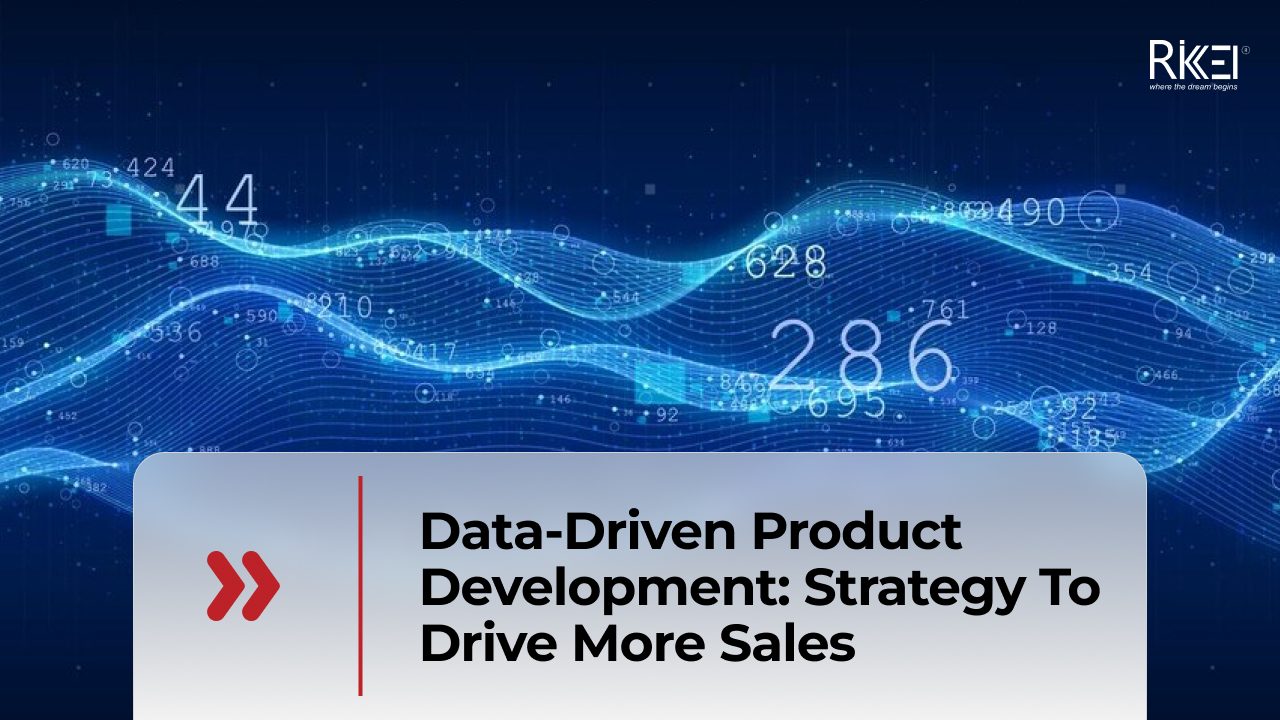
August 8, 2024
Data-Driven Product Development: Strategy To Drive More Sales
As a business owner, you want your products or services to be well-received upon launch. The most effective way to create a product that satisfies a broad range of customers is to gain insights into their needs and behaviors from the outset. The key lies in data-driven product development, a strategy that many companies have […]
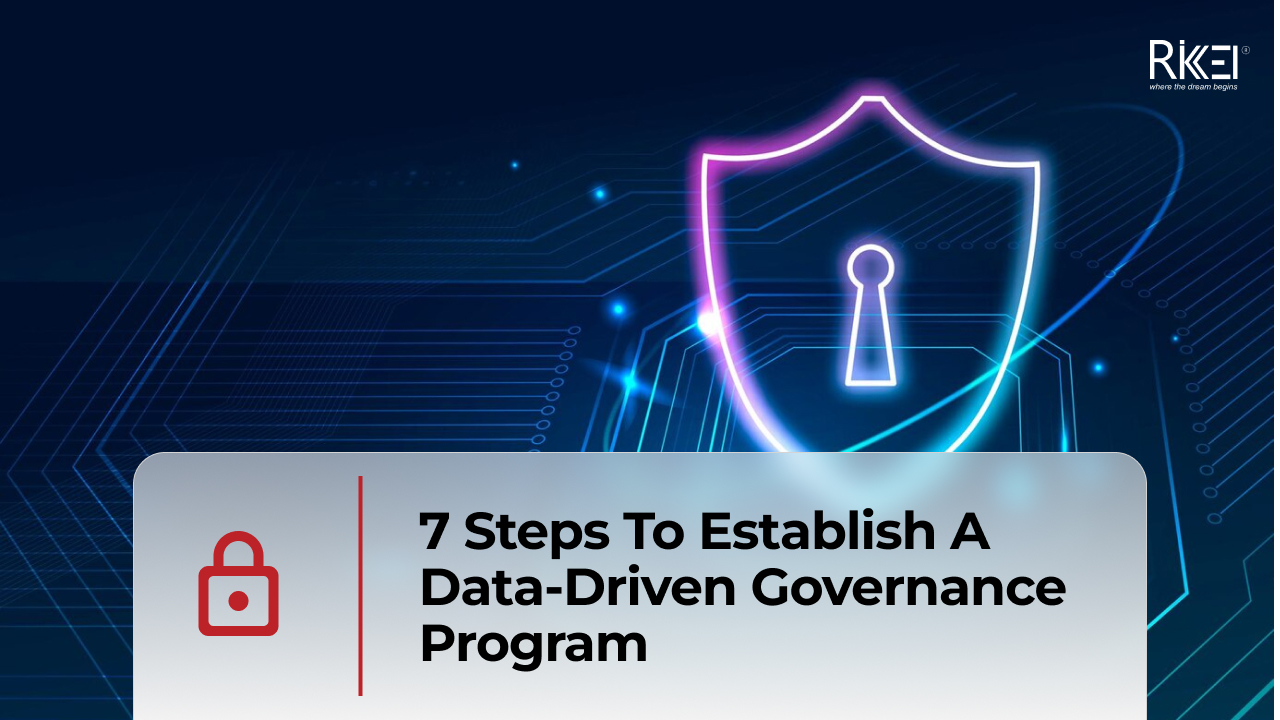
August 8, 2024
7 Steps To Establish A Data-Driven Governance Program
While data-driven approaches significantly benefit organizations in various ways, failure to govern the huge data sets will hurt your business even more. Effective data management also ensures data quality and security. That’s why there is an increasingly high demand for data-driven governance programs. Continue reading for a detailed guide! What Is Data-Driven Governance? Surprisingly, many […]
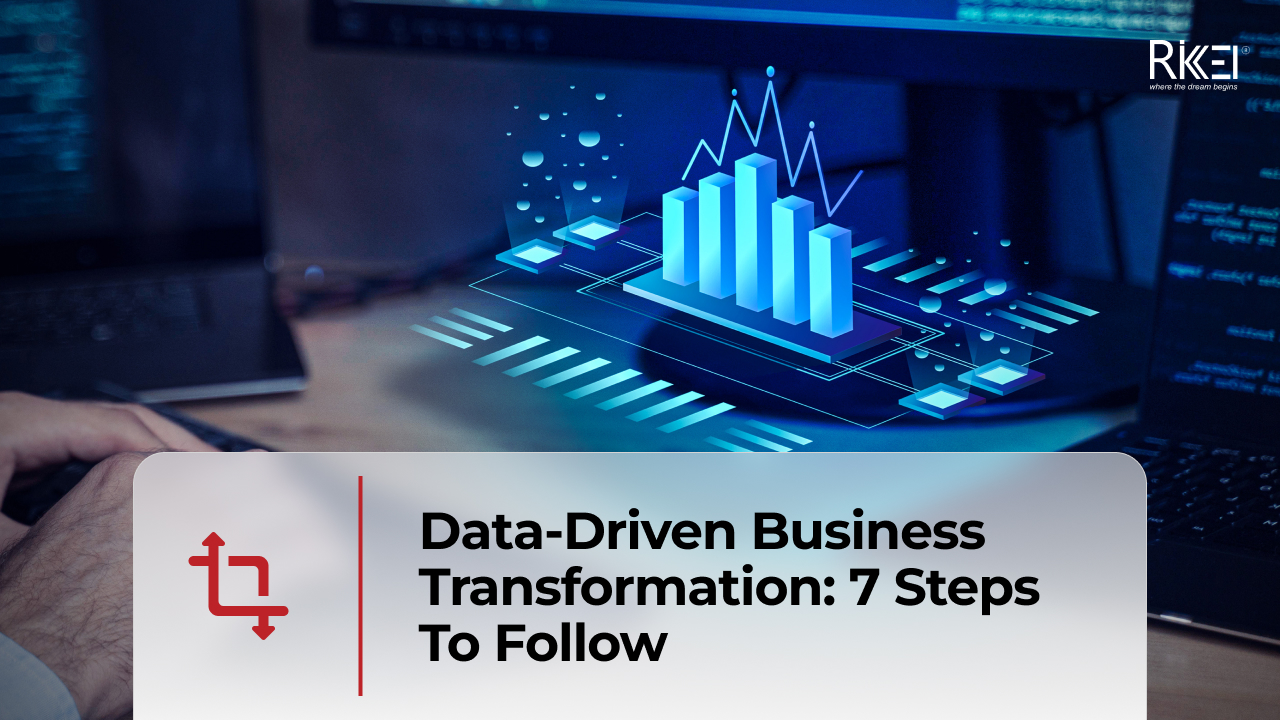
August 8, 2024
Data-Driven Business Transformation: 7 Steps To Follow
Data empowers businesses to make well-informed decisions in different departments, like marketing, human resources, finance, and more. As a business owner, you should also employ data-driven approaches to skyrocket productivity and efficiency. If you are still new to this concept, scroll down for an in-depth guide on data-driven business transformation. What Does A Data-Driven Business […]

August 8, 2024
Data-Driven Security: Transforming Protection Through Analytics
Cybersecurity was once an afterthought for most organizations. But in today’s digital landscape, it has become mission-critical. With this transformation has also come a shift in how security decisions are made. Rather than relying solely on intuition and tradition, leading organizations are embracing data-driven strategies. By using metrics and insights around threats, vulnerabilities, and more, […]
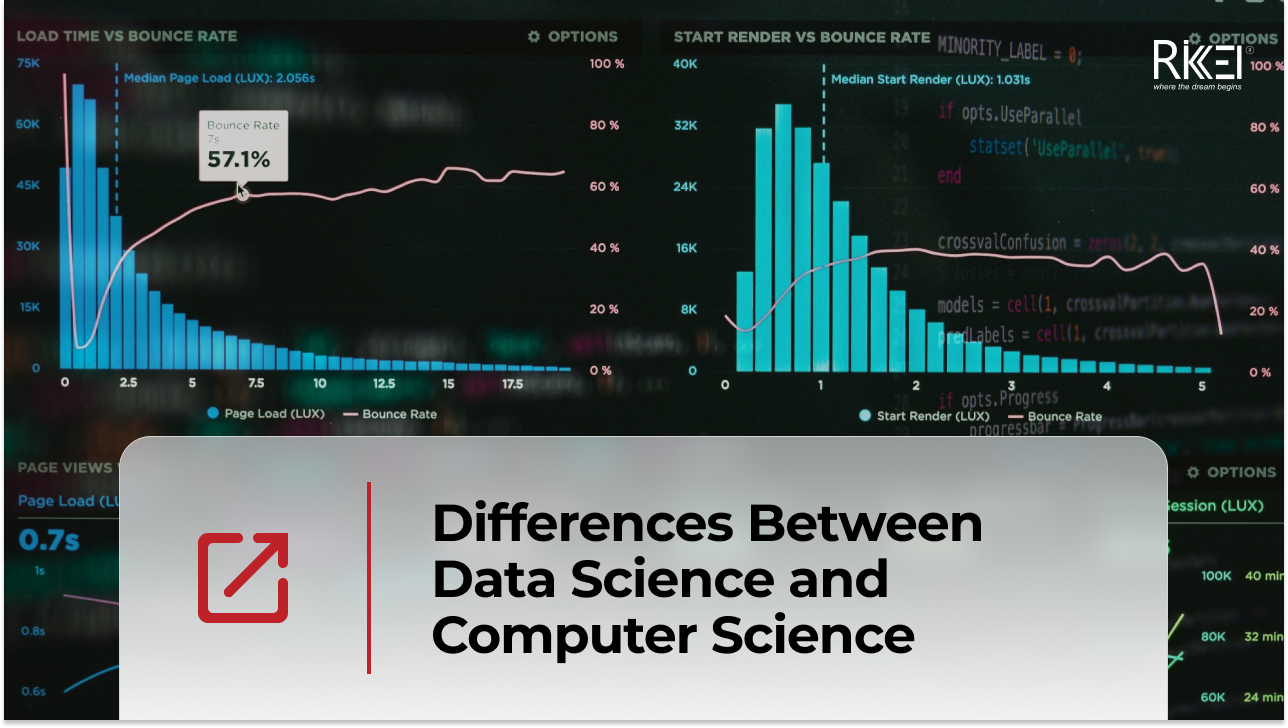
August 8, 2024
Differences Between Data Science and Computer Science
Data Science and Computer Science are distinct fields overlapping in certain areas but have different focuses and objectives. The article below will help you clearly understand the differences and the close connection between the two fields. What is Data Science? Data Science is an interdisciplinary field that combines scientific methods, processes, algorithms, and systems to […]

August 8, 2024
How Real-Time Data Analysis Empowers Your Business
In today’s fast-paced business landscape, the ability to quickly make data-driven decisions has become a key differentiator for success. Real-time data analysis, the process of analyzing data as soon as it’s generated, has emerged as a powerful tool to empower business across industries. By leveraging real-time data analysis, organizations can gain timely and actionable insights, […]

